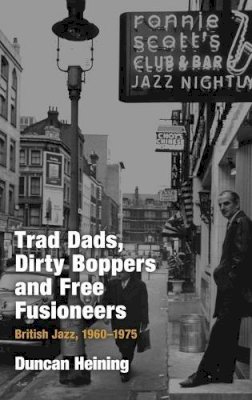
Stock image for illustration purposes only - book cover, edition or condition may vary.
Trad Dads, Dirty Boppers and Free Fusioneers
Duncan Heining
€ 69.42
FREE Delivery in Ireland
Description for Trad Dads, Dirty Boppers and Free Fusioneers
Hardcover. The book follows a number of themes- movers and shakers, drugs and addictions, relationships with Rock and Blues, new technologies, media coverage, arts funding, from clubs to concert halls, record companies and, not least, the economics of Jazz. In dong so, the book challenges many conventional understandings of British Jazz and its scene. Series: Popular Music History. Num Pages: 500 pages, 18 black and white photos. BIC Classification: 1DBK; 3JJPK; 3JJPL; AVGJ. Category: (G) General (US: Trade). Dimension: 241 x 170 x 39. Weight in Grams: 864.
The 1960's was a decade of major transformation in British Jazz and, of course, in British popular music in general. The British Jazz scene had been, arguably, the first outside America to assert its independence. At first slowly but with gathering speed, it began to define an identity that drew increasingly on sources from within its own culture, as well as those from African-American jazz, and from its shared European cultural heritage. This process would in itself prove highly influential, as French, Italian, German and Scandinavian scenes began to follow suit. The nature of Jazz, its scope and potential were re-examined and reformulated in this period with important implications for its musicians and its audience. But the external forces acting upon the UK Jazz scene were both global and local in origin. On the one hand, Jazz was not immune from the economic, social and cultural changes that occurred following the Second World War and which continued apace in the 1960's. Its development was both affected by and reflected those changes and the new ways of thinking and acting that arose from them. On the other hand, wider global economic and political changes, in particular in America, would continue to have a major impact on British Jazz. For these reasons, any history of British Jazz in the 1960's must seek to explain these trends and describe which were global and which were local in origin. It must show how forces outside the music acted upon it and both created and limited its potential for development. But it must also define the personalities, as well as the context in which they functioned. Jazz is made by its musicians and is ultimately changed by them. What were the records that they made which defined the era? From where did their inspiration arise? And how did their audience respond? Trad Dads, Dirty Boppers and Free Fusioneers follows a number of themes - class, education, drugs and addictions, relationships with Rock and Blues, race and immigration, gender issues, the arts, politics and that sixties buzzword, 'freedom'. In doing so, the book challenges many conventional understandings of British Jazz and its scene. This is the definitive history of British Jazz - and the context in which it was defined - the 1960s.
Product Details
Format
Hardback
Publication date
2012
Publisher
Equinox Publishing Ltd United Kingdom
Number of pages
500
Condition
New
Series
Popular Music History
Number of Pages
500
Place of Publication
London, United Kingdom
ISBN
9781845534059
SKU
V9781845534059
Shipping Time
Usually ships in 15 to 20 working days
Ref
99-2
About Duncan Heining
Duncan Heining has has been writing about jazz, improvised music and 20th century composition since 1996. He has written for Avant Magazine, Record Collector, The Independent and The Independent On Sunday. His main outlets currently are Jazzwise, Jazz UK and the All About Jazz website. In 2010, Scarecrow Press published his biography of African-American composer and musical theorist George Russell, George Russell - An American Composer.
Reviews for Trad Dads, Dirty Boppers and Free Fusioneers
'A must-read for anyone interested in British jazz, and a thoughtful assessment of a radical period in British history.' Mike Hobart, Financial Times 'His primary information sources are 70 (yes, really!) of his own first hand interviews with musicians and associates. The fact that Heining is dealing largely with his ... musicianly peer group ... brings with it a sense of involvement in a text which, though densely-packed, is compellingly articulate. Substantive and scholarly, TDDB&FF is also an enjoyable and rewarding read.' Roger Thomas, Jazz UK 'Heining deserves much credit for this epic tome exploring British jazz in one of its most exciting, if exasperating, eras. [He] has undertaken very thorough research: he has interviewed countless musicians, while his own spry style keeps you charmed. Trad Dads is a special contribution to jazz writing.' Jazzwise
